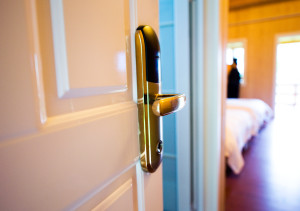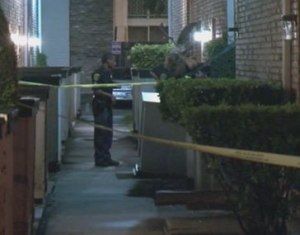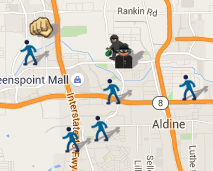 Many travelers relax while on vacation, sometimes leaving themselves vulnerable to theft and assault. While security measures are not typically part of the hotel selection process, Independent Traveler suggests a little research may reduce a traveler’s risk of becoming a victim of hotel violence. We have highlighted some hotel safety tips below. Read the complete report at Independent Traveler.
Many travelers relax while on vacation, sometimes leaving themselves vulnerable to theft and assault. While security measures are not typically part of the hotel selection process, Independent Traveler suggests a little research may reduce a traveler’s risk of becoming a victim of hotel violence. We have highlighted some hotel safety tips below. Read the complete report at Independent Traveler.
Before Your Stay
Long before you actually book your hotel, start by doing your homework. Take a careful look at the security situation in the country and/or city you’ll be visiting….
When the time comes to book your hotel, don’t just look at rates and amenities — pay close attention to location as well. Is the hotel in an upscale residential neighborhood, a bustling business district or a seedy commercial area? Is it safe to walk around after dark? Is there a police station nearby? All of these factors could affect the likelihood of a break-in or assault during your stay. You can find neighborhood information online or in a good guidebook.
You’ll also want to find out about the hotel’s own security measures. Call ahead and ask whether the front desk is staffed 24 hours a day, if there are security guards on the premises and if there are surveillance cameras in the public areas…. Is access to guestroom floors restricted to guests only? If hotel staff can’t offer any specific examples of what they do to keep guests safe, book somewhere else.
Checking In
Don’t accept a room on the ground floor if you can avoid it. Many safety experts recommend staying somewhere between the third and sixth floors — where rooms are high enough to be difficult to break into, but not so high that they’re out of the reach of most fire engine ladders.
If you’re staying in a motel where doors open directly to the outside (rather than a hallway), see if you can get a room overlooking an interior courtyard instead of a parking lot.
Don’t let the front desk attendant publicize your room number. If he or she announces it out loud when giving you your key, ask for a different room.
While you’re at the front desk, ask what phone number you should dial in case of emergency. Is there a direct line to the hotel’s security team…?
Upon arriving at your room, immediately identify a fire escape route. Check the location of the nearest stairwell and/or emergency exit (elevators should be avoided during a fire) and figure out a couple of potential plans for escape in case the hallway is blocked in one direction or another.
Check the locks on the windows (and balcony door, if applicable) as soon as you arrive, and notify the front desk if any are not functioning. It’s a good idea to check these locks again each time you return to the room, as housekeeping may open them and forget to close them again.
During Your Stay
Keep your door locked at all times whenever you’re in your room — including any deadbolts, security chains or swinging metal security locks. Never prop your door open, no matter how briefly.
At night, leave a pair of shoes next to the bed in case you need to leave in a hurry. Keep your room key, wallet and a flashlight close to hand as well.
If someone comes to your door unexpectedly and claims to be hotel staff, call the front desk to make sure the visit was actually authorized. Never open your door to someone until you’re sure of their identity; use the peephole instead.
Protect your valuables by using the hotel safe — or, better yet, leaving them at the front desk while you’re out. Get a written receipt for anything you leave with the front desk and find out whether you’re covered in case of loss. (Many hotels do not accept liability for items left in guestroom safes.) If you’re traveling with a laptop, you may want to consider bringing a security cable to lock it to a piece of furniture. Small locks are also available for suitcases.
When you leave the room, leave the TV or radio on, or put your “Do Not Disturb” sign on the door; both of these tricks will give potential thieves the impression that you’re still there. (You can contact the front desk to arrange a housekeeping visit even if the “Do Not Disturb” sign is up.)
The hotel parking lot and hallways should be well lit. Report any outages to the front desk and ask for a security escort if you feel unsafe.
If you do experience a crime during your stay, don’t simply complain to the hotel — file a police report as well….
Know Your Rights
Generally, hotel and motel owners are required by law to protect guests from any foreseeable harm. For example, should a hotel owner be aware of prior criminal activity on property, they have a duty to take security precautions to protect guests and deter future violence. Should the hotel owner or manager fail in this duty, they may be held civilly liable for any injuries or wrongful deaths which occur as a consequence.
We’ve Recovered Millions for Our Clients…Contact us Now for a Free Consultation.
The Murray Law Firm has extensive and successful experience in representing victims of hotel and motel security negligence and we offer our legal expertise, if desired. We typically represent our Clients on a contingency agreement, which generally means that no fees or payments are owed until and unless we recover. Anyone seeking further information or legal representation is encouraged to contact us via e-mail (click here) or call at 888.842.1616. Consultations are free and confidential.
 The Legal Herald
The Legal Herald



 Nursing home residents suffer frequent falls, all too often resulting in permanent disabilities, reduced quality of life and fatality. While physical health often contributes to these falls, many causes are the result of safety hazards, which may have been prevented.
Nursing home residents suffer frequent falls, all too often resulting in permanent disabilities, reduced quality of life and fatality. While physical health often contributes to these falls, many causes are the result of safety hazards, which may have been prevented.


